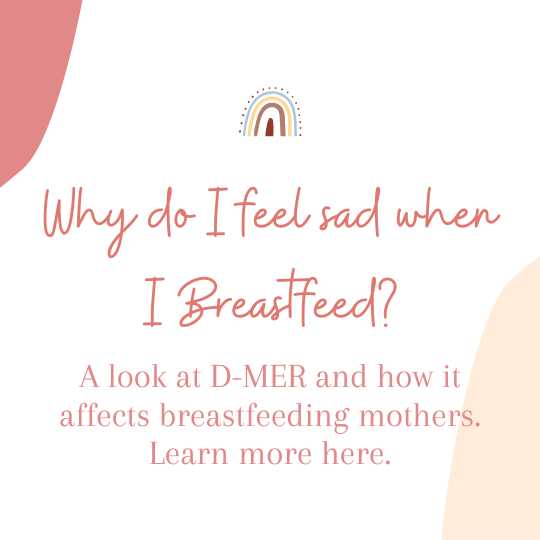Why Do I Feel Sad When I Breastfeed?
Mommy Care Team
Do you notice a stark drop in your emotions as you start to breastfeed? About nine percent of people who breastfeed are affected by a condition or experience called D-MER. This number might actually be even higher due to a lack of reporting.
What is D-MER?
D-MER is a term that means Dysphoric Milk Ejection Reflex. That is a mouthful. This term is used to describe a short and sudden dip in emotions a breastfeeding person can experience. This dip happens just before your let down occurs and can last for a short time afterwards as well. Many women describe it as intrusive negative thoughts (unwanted in nature) associated with nursing or breastfeeding.
Why Haven’t I heard of D-MER yet?
This experience is a recently documented one which might explain why you have not yet heard of it before. It was first researched or reported in 2007 when a breastfeeding counselor experienced the symptom in her third pregnancy and sought help from fellow professionals. That counselor is Alia Macrina Heiss. Heiss is considered the one to first discover, document, and research D-MER. She published the first book, Before the Letdown: Dysphoric Milk Ejection Reflex and the Breastfeeding Mother in 2017.
In fact, it seems as though there are only a few papers, and one book written on the topic. All of the research appears to focus on breastfeeding mothers at the exclusion of pumping or exclusive pumping mothers. And much of the research has been conducted in Australia.

What Makes D-MER Different?
This experience is not the same as postpartum depression or anxiety. It also differs from Breastfeeding Aversion Resistance or BAR or a general dislike of breastfeeding. All of these are experiences that certain breast/chest feeding people have and they are all valid.
What makes D-MER different is the timing. Starting with just before your letdown and lasting a few minutes. There is a potential link to the levels of serotonin in a mother's system. Finding ways to adjust or increase the levels of this or other hormones may be a treatment for people experience D-MER.
Why Did It Take So Long
Postpartum is murky. It’s a tough time for many mothers. Just admitting that you have negative feelings as a result of becoming a mother can be tough. Now add in a nuance about when you experience those feelings, how long you experience them, and what might alleviate them. It’s no wonder more mothers couldn’t distinguish this from postpartum anxiety or depression.

How Do I Know If I Have D-MER?
The dip or drop in feelings happens around your letdown and lasts for a few minutes. Some studies describe these feelings last for five minutes and one resource suggested up to ten minutes. Some mothers experience the symptoms for the entirety of their breastfeeding journey while others may find relief around the third month of their postpartum period.
If you have persistent feelings you may want to speak to an expert on Perinatal Mood and Anxiety Disorders or PMADs for short. Between 60-80% of new mothers will likely experience one of these, often postpartum depression or anxiety. But only about 9% of mothers are likely to experience D-MER. You can read a full blog we have put together on determining whether you might want to talk to a professional about PMADs here.
To make matters more complicated, mother’s who experience one or more PMADs are not exempt from experiencing D-Mer as well.
Mothers report feelings of homesickness, sadness, panic, paranoia, gloom, self-hatred, and anger. Some mothers have even reported thoughts of suicide.
Can I Experience D-MER When I Pump?
From our understanding you can experience these symptoms anytime your body experiences the milk ejection reflex, whether it’s a spontaneous letdown, nursing, or pumping. Macrina Heiss told Romper that exclusive pumping might be an option for mothers who have D-Mer as the pump is not as successful at triggering the letdown reflex.
We know from working with pumping people first hand that this is true for some and for others the pump is just as triggering. Your pumping experience is as unique as you are. If you experience these symptoms pumping please keep reading for suggested treatments.

What Are the Treatments?
Many of the suggested treatments for D-MER are things that you can start trying at home today. Experts suggest trying more time doing skin to skin with your baby. This contact has been shown to help regulate hormones, improve mood, and of course, establish a bond with your baby. Experts also suggest relaxation techniques such as massage, positive affirmations, listening to music, breathing exercises, etc.
We suggest reaching out to a professional, a therapist who has experience with Perinatal Mental Health and/or Perinatal Mood and Anxiety Disorders and if you can find it, D-MER specifically. You could also reach out to a lactation professional such as an IBCLC (perhaps one more familiar with D-MER) to receive more individualized lactation care to support your journey. These lifelines will not only be able to help determine whether what you are experiencing is D-MER or something else but give you support in moving forward.
Practicing relaxation techniques and self-treating at home leaves one major component out of your self care: Speaking to someone about what you are going through. Postpartum Support International or PSI can help you find someone with whom you can connect and feel comfortable sharing as well as the United States Lactation Consultant Association to find an IBCLC.
There is comfort in knowing that you are not alone. There is a Facebook Group full of people who are experiencing or have experienced something similar. Joining the group can help to show you that you are not alone and this is something that many people deal with. It can also give you additional people to connect with.
Pumping is breastfeeding. At BeauGen our mission is to make mommying and parenting feel good. If you are experiencing any kind of pain at the pump, physical or emotional, we want to help. We hope you found this article informative. If you ever need someone to talk to, or something doesn't feel right, we urge you to find someone to talk to here.
Research Articles on D-MER
2022: Dysphoric milk ejection reflex as a new diagnostic and therapeutic challenge in lactation care - literature review by: Katarzyna Skowrońska, Anna Chmura, Patrycja Baciur, and Agnieszka Środoń
2021: Dysphoric Milk Ejection Reflex: The Psychoneurobiology of the Breastfeeding Experience by: Reim Deif, Emily Michelle Burch, Jihan Azar, Nouran Yonis, Macy Abou Gabal, Nabila Al Kramani, and Duaa Dakhlallah
2020: Dysphoric Milk Ejection Reflex by Allison J. Stacey
2019: Dysphoric Milk Ejection Reflex: A Descriptive Study by: Tamara L. Ureño, Cristóbal S. Berry-Cabán, Ashley Adams, Toni L. Buchheit, and Susan G. Hopkinson
2018: Dysphoric Milk Ejection Reflex: A Case Series by: Tamara L. Ureño, Toni L. Buchheit, Susan G. Hopkinson, and Cristóbal S. Berry-Cabán
2018: The Mystery of D-MER: What Can Hormonal Research Tell Us About Dysphoric Milk-Ejection Reflex? By Kerstin Uvnas-Moberg, MD, PhD, Kathleen Kendall-Tackett PhD, IBCLC, RLC, FAPA
2011: Dysphoric milk ejection reflex: A case report by: Alia M Heise, Diane Wiessinger
2010: A Case of Dysphoric Milk Ejection Reflex (D-MER) by Suzanne Cox
